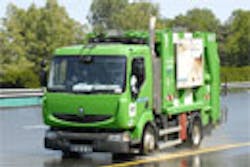Despite uncertainty over the cost-effectiveness of hybrid technology, fuel supply and emissions concerns are helping drive interest in hybrid vehicles both for consumer and commercial use, according to a new study released by consulting firm ABI Research –
“The question of a hybrid’s total cost of ownership is not an easy one to answer,” said David Alexander, ABI Research’s principal analyst. “Calculations have to be made for the life of the vehicle – anything from five to ten years or even longer. With prototypes running on test for only a couple of years so far, there is considerable uncertainty in projecting the maintenance requirements and component lifetime for some very new vehicle technology.”
Despite that concern, hybrid use is growing not only among consumers, but also among commercial fleets as well, according to the company’s new report “Commercial Vehicle Hybrids”.
In the consumer market, individuals can choose from a variety of hybrids based on personal preference as much as simple economics, said Alexander. In the commercial vehicle world, however, fleet managers who choose hybrids face a tougher business question: will the total cost of ownership of a vehicle equipped with hybrid technology be less than that of an equivalent conventional vehicle?
There is a steadily growing list of hybrid systems available for commercial vehicles using different technologies, such as parallel and series electric systems, plus parallel and series hydraulic products. Alexander said each system aims at specific market niches, with each offering measurable benefits and known costs. Though costs are expected to come down as the technology matures and sales volumes grow, that will not happen until purchasing managers have greater confidence in hybrid operational characteristics, he said.
All that aside, ABI’s research indicates results from initial testing look good. Fuel savings and reduced emissions are being measured, and maintenance logs show lower costs, especially for brakes. But ABI also cautions that the results are very specific to duty cycle, and there have been instances where hybrid drive technology has proved to be less appropriate than conventional diesel engine power.
Alexander said it’s up to fleet managers to identify where their operations can best take advantage of commercial hybrid drive technology. And if current economic conditions continue, fuel costs increase, and more government incentives are introduced, that decision is expected to get easier.
About the Author
Sean Kilcarr
Editor in Chief
Sean Kilcarr is a former longtime FleetOwner senior editor who wrote for the publication from 2000 to 2018. He served as editor-in-chief from 2017 to 2018.
